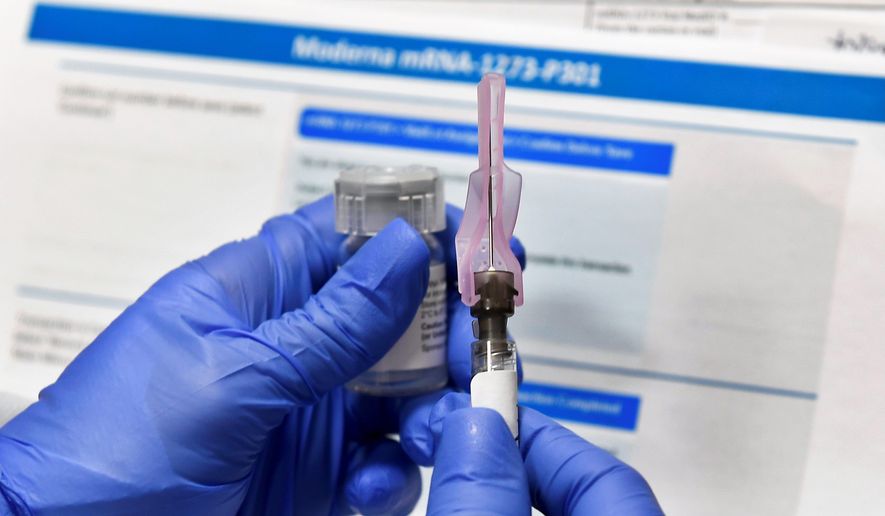Drugmaker Moderna will probably know by November whether its vaccine is effective against the coronavirus, describing its human trial in detail Thursday to gain public trust while the White House defended its speedy timeline for inoculating the country.
Moderna CEO Stephane Bancel said based on enrollment and the rates of infection, the company’s “best possible outcome” would be a sense of efficacy by October — though November is its best guess right now.
The timeline could drag if there is less virus circulating as the trial determines how many people got sick within the vaccine group versus the placebo group. That could push things into December, Mr. Bancel told CNBC.
The Cambridge, Massachusetts, drugmaker is one of three prominent firms in late-stage trials of COVID-19 vaccines in the U.S. The others are AstraZeneca and Pfizer, which says it should know if its vaccine is effective by October.
Dr. Anthony Fauci, director of the National Institute of Allergy and Infectious Diseases, said the deadline for determining efficacy is dependent on how quickly each trial enrolls people, administers the doses and then counts up who gets sick.
“The answer has to be, ’We don’t know,’” Dr. Fauci told The Washington Times. “It depends on a number of things. It depends particularly on whether or not there are infections within the context of a vaccine trial.”
He said sites where the vaccines are being administered are “pretty well distributed” throughout the country.
“The question is, are you accruing people that are really at high risk?” he said.
For instance, young White men may be less likely to contract the disease than minority populations, which have been hard hit by the pandemic.
Moderna said it has enrolled 25,000 of its anticipated 30,000 participants, and that over 10,000 have received their second dose already. So far, 28% of enrollees are from “diverse communities,” such as Black, Hispanic and other minority populations.
The company released a 135-page protocol that outlines how half of the participants will receive the vaccine and half will receive a placebo of saltwater. The study is blinded, so the company, participants and doctors giving the shots don’t know who is getting which substance.
Participants received an electronic diary to report any adverse reactions from the shots. They will also receive regular check-in calls to monitor for side effects or symptoms of COVID-19.
Moderna said it “felt it was important to release the Phase 3 protocol to provide additional transparency in [the] context of the pandemic.”
To determine whether the vaccine works, scientists will count cases that occur at least two weeks after a participant’s second dose. Under their statistical model, at least 151 cases within the vaccine and placebo groups would be enough to determine whether the vaccine is 60% effective.
Many view a vaccine as the key to restoring a sense of normalcy amid the pandemic, which has killed nearly 200,000 people in the U.S.
The good news is that daily infections are generally declining across the country. The seven-day rolling average stands at 39,000 cases per day compared to 66,000 in mid-July, according to a New York Times tracker.
That’s still higher than the 22,000 per day average in early June.
“If you look around the country, clearly the cases are going down. We still have a very high baseline,” Dr. Fauci told The Washington Times.
“We’ve got to get lower than that,” he said. Otherwise, “it puts you in a very precarious situation to rebound.”
The White House on Thursday continued to distance itself from CDC Director Robert Redfield’s assertion that vaccines won’t be generally available to the American public until the second or possibly third quarter of next year.
“I’m not sure where Dr. Redfield got his particular timetable, but it’s not based on those that are closest to the process,” Mr. Trump’s chief of staff, Mark Meadows, told White House reporters.
“I’m not saying he’s not part of the process,” Mr. Meadows said later. “I’m saying he’s not closest to the decision making as it relates to the clinical 3 trials and the distribution thereof.”
“Generally speaking, speed of development and speed of distribution is not the strong suit for the CDC, and we saw that going back to the early days of the testing regimen that was put forth,” he said, likely referring to the CDC’s early coronavirus test, which failed due to contamination.
A coronavirus adviser to Mr. Trump, Scott Atlas, said Wednesday that 700 million doses will be available to the public by the end of March.
Dr. Fauci said with most vaccines requiring two doses, that would equate to enough vaccine for 350 million people, or slightly more than the U.S. population of nearly 330 million.
• Tom Howell Jr. can be reached at thowell@washingtontimes.com.




Please read our comment policy before commenting.